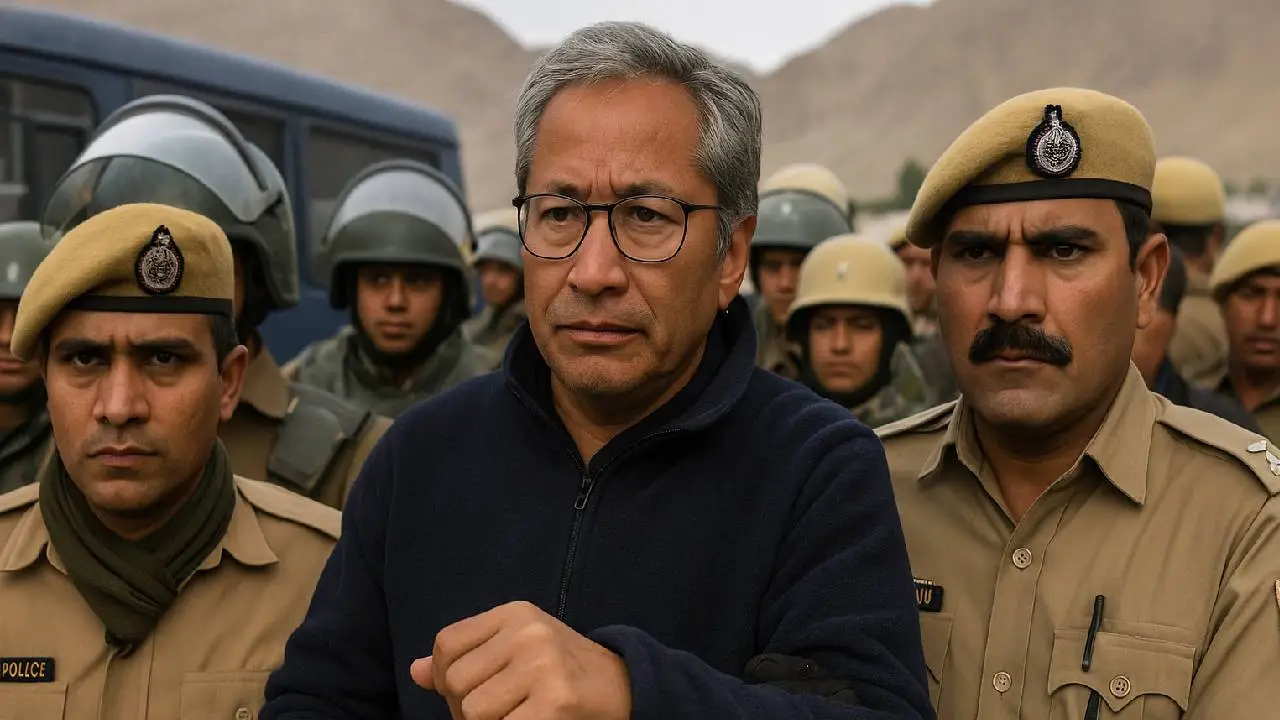
Activist Sonam Wangchuk (Credit:Top Indian News)
National News: The protests in Ladakh demanding full statehood and inclusion under the Sixth Schedule of the Constitution took a violent turn on September 24. Four people lost their lives during the unrest. Dozens of civilians, police officers, and paramilitary personnel were injured. Sonam Wangchuk, who had been on a hunger strike, was leading the demonstrations. Authorities said the situation escalated beyond control, forcing police action. His detention soon followed under strict legal provisions.
Ladakh DGP Jamwal announced Wangchuk’s detention under the National Security Act. He described Wangchuk as having a “history of instigating” unrest. The DGP referred to Wangchuk’s past comments on the Arab Spring, Nepal, and Bangladesh. He said the activist’s speeches had provoked anger before the protests. According to him, Wangchuk’s role needed to be checked through stronger legal measures. The NSA, he argued, was necessary to prevent further disorder.
The police chief also raised questions about Wangchuk’s visit to Pakistan. He pointed out Wangchuk’s presence at a Dawn media house event there. Jamwal mentioned that a Pakistani intelligence operative was earlier caught gathering details about Wangchuk. He suggested such links created suspicion around his credibility. This, according to him, was a big concern for national security. The investigation into his foreign connections is still underway.
Authorities said Wangchuk’s finances are under investigation. The case involves possible violations of the Foreign Contribution Regulation Act (FCRA). The police are examining whether foreign funds were used to support protests. DGP Jamwal indicated that money trails and digital records are being checked. This investigation will decide the next course of legal action. Officials said they cannot ignore possible outside involvement in Ladakh unrest.
The police claimed “so-called environmental activists” attempted to hijack the protest platform. DGP Jamwal specifically named Wangchuk as the prime figure. He said Wangchuk tried to derail discussions with the central government. According to Jamwal, speeches by these activists created mistrust among protestors. The unrest, he said, was fuelled by deliberate provocation. Such interference, according to police, damaged the credibility of the movement.
Congress MP Digvijay Singh strongly opposed Wangchuk’s detention. He said NSA was wrongly used against a man following Gandhian philosophy. Singh reminded that Prime Minister Modi once praised Wangchuk for his work. He credited Wangchuk with shaping Ladakh’s education, healthcare, and culture. Singh argued that promises of statehood and Sixth Schedule were broken by the government. The Congress leader called Wangchuk’s detention unjust and politically motivated.
After Ladakh became a Union Territory in 2019, leaders and activists demanded full statehood. The Sixth Schedule status was also promised to protect local rights and culture. Protestors said these assurances remain unfulfilled even today. The violent protests reflected growing frustration among citizens. With elections ahead, tensions are expected to rise further. Wangchuk’s detention has deepened the political debate. Ladakh’s future remains uncertain under current circumstances.





Copyright © 2026 Top Indian News
